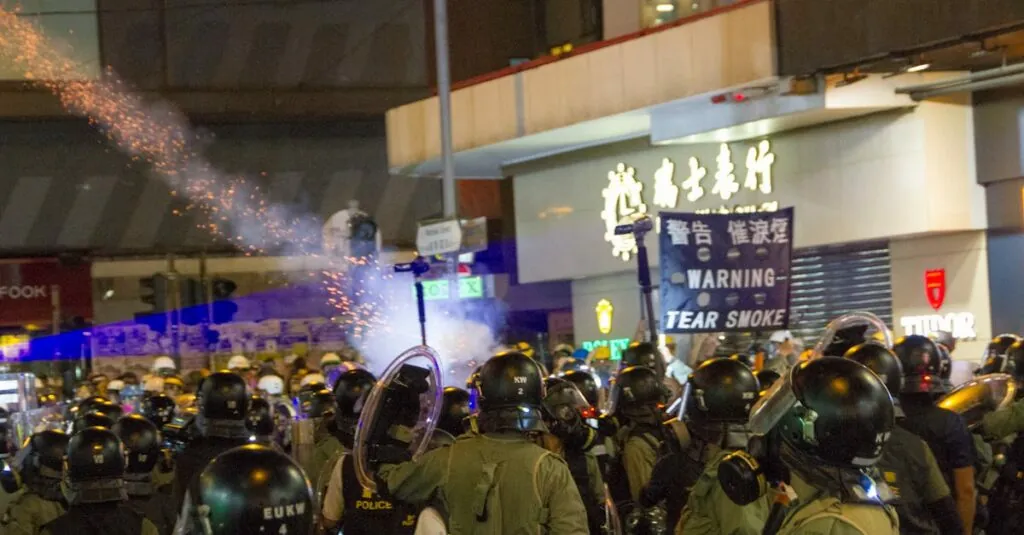Table of Contents
ToggleIn a world where political promises often seem as solid as a soap bubble, political accord enforcement emerges as the unsung hero of governance. Imagine a realm where agreements aren’t just fancy words tossed around like confetti but are backed by real consequences. It’s the difference between a politician saying, “Trust me” and actually putting their money where their mouth is.
Overview of Political Accord Enforcement
Political accord enforcement ensures that governance agreements are credible and actionable. This aspect of politics fosters accountability and responsiveness among leaders.
Definition and Importance
Political accord enforcement refers to the processes and mechanisms that secure adherence to agreements made between political entities. It’s vital for accountability, as it transforms promises into enforceable commitments. Effective enforcement creates trust among citizens, enhancing democratic processes. Without it, political agreements risk becoming mere formalities with no real effect. Politicians must understand that following through strengthens governance and promotes social stability.
Historical Context
Political accord enforcement has deep historical roots, particularly visible in treaties and alliances. Examples abound from the Treaty of Westphalia in 1648, which established many modern state concepts, to the Dayton Agreement in 1995, which aimed to resolve the Bosnian conflict. Each instance highlights the necessity of enforcement for maintaining peace and order. Various countries have employed methods ranging from international oversight to domestic legal actions. These historical frameworks illustrate how effective enforcement can shape political landscapes and societal cohesion.
Mechanisms of Enforcement
Political accord enforcement relies on various mechanisms to ensure compliance and accountability. These mechanisms include diplomatic tools and legal frameworks, each playing a vital role in solidifying commitments.
Diplomatic Tools
Diplomatic tools facilitate cooperation between political entities. These tools often involve negotiations, mediation, and dialogue to resolve disputes. Peer pressure among countries can compel adherence to agreements. Meanwhile, international organizations may assist in monitoring compliance and providing platforms for discussion. Observation missions are a common practice in politically charged environments, ensuring oversight and transparency. Agreements like the Paris Agreement exemplify the use of these diplomatic approaches to promote global collaboration. Effective diplomatic efforts create an environment of trust and mutual respect among nations.
Legal Frameworks
Legal frameworks establish formal guidelines and procedures for enforcing political accords. International treaties, for instance, provide legally binding obligations that states must adhere to. Courts and tribunals can adjudicate disputes arising from these treaties, ensuring that violations are addressed. National laws may also integrate international agreements, allowing local jurisdictions to play a role in enforcement. Implementation mechanisms vary from sanctions to legal remedies, each designed to uphold political commitments. Historical precedents, like the Nuremberg Trials, demonstrate the power of legal frameworks in enforcing compliance and accountability in global politics. Robust legal structures reinforce the integrity of political accords by embedding them into recognized systems of law.
Case Studies
Case studies illustrate the impact of political accord enforcement both positively and negatively. These examples highlight the importance of adherence and the consequences of failure.
Successful Examples
The Dayton Agreement in 1995 exemplifies successful political accord enforcement. It brought peace to Bosnia and Herzegovina after a devastating conflict, emphasizing cooperation among warring parties. International oversight from organizations like NATO ensured compliance with the accord’s provisions. Another instance is the Paris Agreement, where countries committed to reducing carbon emissions through collaborative efforts. Countries actively monitor progress, enabling adjustments to strategies when needed. Such examples show that effective enforcement promotes stability and addresses pressing global challenges.
Challenges and Failures
Challenges in political accord enforcement often lead to failures. The 2015 Iran Nuclear Deal revealed limitations in monitoring compliance. Despite initial enthusiasm, ongoing tensions hindered adherence to the agreement’s terms. Disputes over interpretations contributed to the deal’s fragility, highlighting the need for clear legal frameworks. The failure of the League of Nations also underscores challenges. Lacking the authority to enforce decisions, it struggled to maintain peace, ultimately leading to its dissolution. These cases demonstrate that without robust enforcement mechanisms, political agreements risk becoming ineffective.
Role of International Organizations
International organizations play a significant role in political accord enforcement, serving as mediators and watchdogs. Their involvement enhances the credibility of agreements by providing third-party oversight and support.
UN and Political Accord Enforcement
The United Nations (UN) fosters compliance through various mechanisms, including peacekeeping missions and monitoring frameworks. Noteworthy agreements, like the Paris Agreement, benefit from UN supervision which encourages accountability among member states. Verification processes established by the UN facilitate trust, allowing countries to assess each other’s commitments. Its resolutions frequently hold political entities accountable, ensuring adherence to international law and norms.
Regional Organizations’ Involvement
Regional organizations enhance enforcement by addressing local dynamics more effectively. The African Union (AU) and the European Union (EU) exemplify this effort, often deploying peacekeeping forces or initiating diplomatic interventions. Their proactive approaches can help mediate conflicts while reinforcing political accords tailored to regional context. Additionally, these organizations create platforms for dialogue, facilitating cooperation among member nations to resolve disputes and uphold commitments. Such involvement proves crucial for maintaining stability and promoting unity within regions.
Future Trends and Considerations
Emerging trends in political accord enforcement highlight the growing importance of digital tools and technology. These advancements enable real-time monitoring of compliance through data analytics and blockchain. Enhanced transparency increases trust among citizens, transforming how agreements are perceived and executed.
Analytical models, powered by artificial intelligence, assess risks and predict enforcement challenges in agreements. Predictive analytics offers insights into potential compliance issues before they arise. Increased collaboration among nations encourages shared accountability, fostering a more robust global approach to political accords.
International organizations are evolving to adapt to these trends. Increased focus on multi-stakeholder engagement strengthens enforcement mechanisms, allowing non-state actors to participate actively. The rise of grassroots movements pressures political entities to adhere to agreements, creating a more democratic process.
Legal frameworks also adapt, with countries implementing innovative laws to bolster enforcement. New approaches to dispute resolution emerge, such as alternative dispute resolution (ADR), streamlining compliance processes. Comprehensive regional agreements address specific issues, enhancing local governance and ensuring adherence to commitments.
Sustainability and climate change treaties reflect another vital trend. Emphasis on environmental agreements illustrates a shift toward collective action for global challenges. Policymakers increasingly recognize that successful enforcement hinges on collaboration among diverse players.
Future considerations include the balance between sovereignty and international oversight. Nations remain concerned about retaining control while ensuring compliance with global standards. Ongoing dialogues focus on establishing norms that promote both accountability and respect for national sovereignty.
Monitoring mechanisms develop further in response to these trends. Innovative technology, such as satellite imaging and independent verification, plays a critical role in ensuring compliance. These approaches aim to strengthen the enforcement of political accords, emphasizing the need for adaptation in an ever-evolving geopolitical landscape.
Political accord enforcement stands as a vital pillar in the realm of governance. By ensuring that agreements translate into actionable commitments, it fosters accountability among leaders and builds trust within societies. The historical context and contemporary examples illustrate the necessity of robust enforcement mechanisms, which not only uphold political promises but also enhance democratic processes.
As the landscape of political agreements evolves, the integration of technology and innovative legal frameworks will play an increasingly important role in maintaining compliance. Ultimately, effective enforcement of political accords is essential for promoting stability and addressing global challenges, ensuring that political promises are more than just words on paper.







